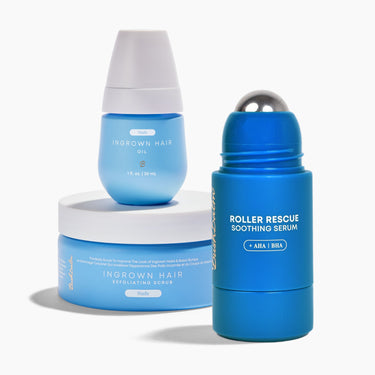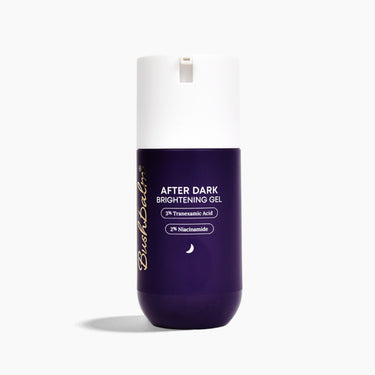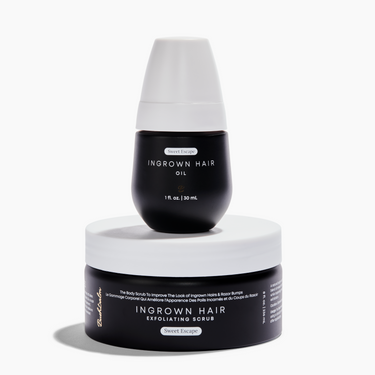Why Skin Feels Tight and Itchy After the Shower
Why does the skin feel itchy after the shower?
These symptoms are most commonly indicative that the skin is dry. Dryness can cause the skin to tighten which creates an itchy sensation.

What causes this dryness?
Dry skin post-shower could result from a combination of factors. See the most common factors below:
1. Harsh cleansers
2. Hot Water
3. Showering Too Frequently
Solutions to dry and itchy skin

1. Use gentle shower cleansers
Gentle shower cleansers with natural ingredients can go a long way for the skin. When choosing a shower cleanser, look for ingredients such as:
2. Moisturize your skin in the shower
Incorporating products into your shower-routine that will soothe and hydrate your skin is game changing! Opt for cleansers that are made with a delicate blend of plant derived ingredients that will soothe and moisturize, such as aloe vera, jojoba oil, and glycerin. You should also try incorporating an exfoliating routine 2-3times a week. Our ultra-hydrating sugar scrubs will give your skin an irresistibly smooth look and feel. The star ingredient responsible for this baby-smooth effect is Jojoba Oil. This ingredient is known for its soothing properties and calming sensation that temporarily relieves irritation and discomfort - especially dryness. Jojoba oil comes in the form of a wax that coats the top layer of the skin in order to retain the moisture and prevent the skin from drying out. Investing in products that are designed to moisturize and nourish the skin is key to preventing that itchy and irritating feeling after the shower.
3. Moisturize your skin right after the shower
The skin is most absorbent within 2 minutes of stepping out of the shower so take advantage of this window! Using ultra-hydrating creams and oils while the skin is still slightly damp can help lock in moisture. We recommend applying your hydrating treatment oils, Tush cream and all-over body moisturizers right after patting the skin dry with your towel. This will soothe the skin and get rid of the itchy and tight feeling you may experience.

4. Shower in luke warm/cold water
Cold water boosts blood circulation. The blood carries the necessary nutrients and oxygen needed by the body to function normally. It follows that when one showers using cold water (even luke warm water), the blood flows more effectively and in turn will completely nourish your skin cells and maintain hydration in the skin.
5. Shower less OR limit the amount of time you spend in the shower
Showering less frequently/ for less time can preserve your natural protective oils that keep your skin healthy and hydrated. In fact, many dermatologists recommend showering at least every other day or 2-3 times a week. If you’re one to workout or do things in your day that require a shower try to keep your showers as short as possible (we recommend showering for 3-4 minutes)

Overall it's important to minimize the frequency by which you take showers, limit the length of the shower and/or reduce the temperature of shower. It follows that when you do shower, remember to utilize this time with quality products that will keep your skin clean, hydrated and nourished for days.
What To Look For in Body Cleansers
Jojoba Oil (Simmondsia Chinensis Seed Oil)
Jojoba Oil is a soothing ingredient that coats the top layer of the skin in order to retain moisture and prevent the skin from drying out. This coat is rich in fatty acids and packed with Vitamin E, A, and D making it the ideal ingredient to preserve the skin’s natural moisture and restore/maintain a balanced pH level.
Tea Tree Oil (Melaleuca Alternifolia)
Packed with antibacterial, anti-inflammatory, antiviral, and anti-fungal properties, Tea Tree Oil is a natural healer fit to combat any bad bacteria down there. This star ingredient is the key to fighting off yeast or fungus growth around your vagina. This ingredient will also keep the vulva moisturized enough to be healthy but not too moist so bad bacteria can grow.
Copaiba Balsam Essential Oil (Copaifera Spp)
A major property of Copaiba Oil is Beta-caryophyllene; Beta-caryophyllene has anti-inflammatory, antimicrobial, antibacterial, and antioxidant properties. Like Tea Tree Oil, Copaiba is an all-natural anti-inflammatory agent that will heal skin irritations such as bad bacteria.
Grapeseed Oil (Vitis Vinifera Seed Oil)
Grapeseed Oil protects and preserves the skin's soft and supple appearance. The ingredient has properties such as vitamin E and phenolic antioxidants which work together to remove bacteria from the surface of the skin. This lightweight oil penetrates the skin and activates Vitamin E and C in the skin which protects and preserves the skin from external agents.
Aloe Vera
Aloe is an amazing source of antioxidants and vitamins that help protect the skin.
Glycerin
The importance of using pH balanced products around the vagina
pH stands for potential for hydrogen. The pH level of the skin refers to how acidic or alkaline the skin is on a scale from 1-14. On the pH scale, 7 is neutral, below 7 is acidic (0 being the most acidic), and above 7 is alkaline (14 being the most alkaline). A normal vaginal pH level ranges from 3.8 to 4.5 (on the acidic side). An acidic pH kills bacteria and keeps the skin balanced, hydrated, and rejuvenated. An acidic pH helps keep your skin balanced, hydrated, healthy, and radiant.
So what does all that mean? Simply put, the skin must maintain a balance of acidity and alkalinity in order to combat germs, fight infection, retain/store nutrients and minerals and protect you against external stresses.
If the pH balance is off, the skin can have adverse reactions. See for yourself:
- When the pH balance is too alkaline, one may experience acne, dryness, accelerated aging (fine lines and wrinkles). This can lead to conditions like eczema.
- When the pH balance is too acidic, one may experience inflammation and irritation. This effect is similar to what would happen if you put a harsh chemical peel on your skin; the skin becomes "burnt", sensitive, irritated, and prone to breakouts.
When the vagina is pH balanced on the interior and exterior, good bacteria will thrive and protect this intimate area from bad bacteria and yeast. On other hand, when the pH balance is thrown off this can lead to an imbalance in bacteria and yeast levels which puts you at risk of developing a number of infections such as UTIs, yeast infections, vaginal odor, or bacterial vaginosis. Bottom line: only ever use products that are pH balanced around the vagina and on the vulva.
For more information on the ideal ingredients to look for in your skincare products, check out this blog.























